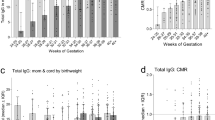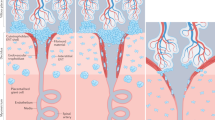Abstract
ANTIGENS introduced to the human foetus have been considered as “self” and thus not to provoke an immune response1. But, no sudden changes in the immune mechanisms seem to coincide with birth, and the development of adult immune responses is gradual. Moreover, in sheep, antigens can give rise to more or less mature immune responses in the foetus2,3, dependent on the stage of gestation. The nature of transmission of these immune responses from mother to foetus remains unclear. Brody et al.4 demonstrated in humans that T-lymphocyte sensitisation could be transmitted from mother to foetus and considered this was due to transplacental passage of antigen. Field and Caspary5 showed that cell-mediated responses can be induced in the foetus, but thought that either maternal lymphocytes or some subcellular lymphocyte factor crossed the placenta to sensitise the foetal lymphocytes. We have tested ten randomly selected normal mothers and their babies at parturition for evidence of sensitisation to antigens of Mycobacterium leprae. We found that when the mothers showed sensitisation their babies did too: the children of unsensitised mothers were not sensitised. We consider the likeliest explanation for our findings is the transplacental passage of a soluble lymphocyte factor.
This is a preview of subscription content, access via your institution
Access options
Subscribe to this journal
Receive 51 print issues and online access
$199.00 per year
only $3.90 per issue
Buy this article
- Purchase on Springer Link
- Instant access to full article PDF
Prices may be subject to local taxes which are calculated during checkout
Similar content being viewed by others
References
Burnet, F. M., Self and Non-Self (Cambridge University Press, Cambridge, 1969).
Silverstein, A. M., Uhr, J. W., Kraner, K. L., and Lukes, R. L., J. exp. Med., 117, 799–812 (1963).
Silverstein, A. M., Prendergast, R. A., and Kraner, K. L., J. exp. Med., 119, 955–964 (1964).
Brody, J. I., Oski, F. A., and Wallach, E. E., Lancet, i, 1396–1398 (1968).
Field, E. J., and Caspary, E. A., Lancet, ii, 337–342 (1971).
Closs, O., Infect. Immun., 11, 1163–1169 (1975).
Godal, T., and Negasse, K., Br. med. J., 3, 557–559 (1973).
Rotberg, A., Bechelli, L. M., and Keil, H., Int. J. Leprosy, 18, 209–220 (1950).
Desai, R. G., and Creger, W. P., Blood, 21, 665–673 (1963).
Turner, J. H., Wald, N., and Quinlivan, W. L. G., Am. J. Obstet. Gynec., 95, 831–833 (1966).
Anderson, J. M., and Ferguson Smith, M. A., Br. med. J., 2, 166–167 (1971).
Olding, L., Acta paediat. scand., 61, 73–75 (1972).
Lawrence, H. S., Proc. Soc. exp. Biol. Med., 71, 516–522 (1949).
Author information
Authors and Affiliations
Rights and permissions
About this article
Cite this article
BARNETSON, R., BJUNE, G. & DUNCAN, M. Evidence for a soluble lymphocyte factor in the transplacental transmission of T-lymphocyte responses to Mycobacterium leprae. Nature 260, 150–151 (1976). https://doi.org/10.1038/260150a0
Received:
Accepted:
Issue Date:
DOI: https://doi.org/10.1038/260150a0
This article is cited by
-
Inheritance patterns of idiotype expression: maternal-fetal immune regulatory networks
Immunogenetics (1981)
Comments
By submitting a comment you agree to abide by our Terms and Community Guidelines. If you find something abusive or that does not comply with our terms or guidelines please flag it as inappropriate.



